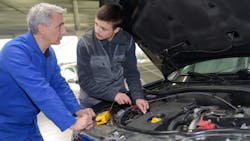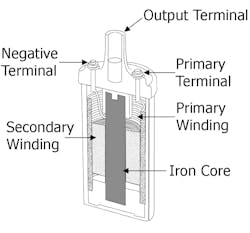As we make our way through our careers all of us at some point will encounter a technician who appears to have tremendous success. He or she typically appears relaxed and enjoying their day, rather than being stressed throughout it. Next time you have a moment to yourself, I'd like for you to think about those who motivate you from within our automotive community, those who leave a lasting impression, and you strive to be like. Then ponder how they carry on like that. I’m confident that if you take the time to pick their brain, you will find that their success as technicians didn’t happen by chance.
It's a common occurrence to hear me speak (or read an article I've assembled) about the importance of building a diagnostic game plan, particularly when we are looking to improve our level of professional knowledge and efficiency in the shop. However, I've neglected to stress the importance of implementing a game plan for our careers.
As the title states, success is no accident! Of course, everyone gets lucky now and then, but in my eyes, attaining true success also means enjoying what you do and turning that job into a rewarding and fulfilling career. Just a short 24 years ago, I began my first day in my first technician's position. I was a bit intimidated and not sure how to proceed. I lacked the common sense we all rely on so heavily and it made my day very mentally and emotionally taxing. There were times I thought to myself that this line of work just wasn't for me, and I contemplated quitting. I’m so glad I didn’t, though.
Master what applies to the majority
What I lacked was a plan. And because of this, I carried on through my days shooting from the hip and just barely getting by. After a few long and agonizing years of this internal turmoil, I crossed paths with someone who changed my career forever. He was an incredible mentor who taught me how to be a self-learner and to take responsibility for my personal growth and career development. No one is going to do it for you!
One of the first concepts I’ve learned to implement was to fortify myself with knowledge and understanding that could be applied to virtually everything I encounter. Think about it like this: If you performed the same job on the same vehicle, over and over again each day, there would likely be a spot on your tool cart to accommodate those required tools. They would rarely get stowed in the toolbox throughout the workday. Why? Because you are sure to use them very shortly. Learning how individual components work (at the most basic level) will allow you to gain an understanding of the devices that make up the systems we see in almost every vehicle we encounter. Some examples of these components and systems are below:
Common components:
- thermistors
- inductive devices (like DC motors, solenoids, relays, ignition coils, and alternators)
- variable reluctance sensors
- hall-effect sensors and magneto-resistive element sensors
- potentiometers
- rheostats
Common systems:
Taking the time to master the functionality of the above components as well as the systems they make up allows them to become second nature. I can recall the knowledge at will and don't have to waste my time continually studying the functionality of these common devices any longer. This pushes efficiency and self confidence through the roof!
Read to succeed
There will be plenty of occasions when what you’ve mastered simply isn’t enough, so get used to it. That’s the time to do some more research (as technology is always advancing). Don’t hesitate to step away from the vehicle and read. Although this seems counterintuitive to productivity, you'll save lots of time in the long run.
Focus on seeking out information that will help you understand what a system is set out to do, or better stated, what goals are to be accomplished. Understanding what the system is in place for will give you an idea of what is required to make it tick. Seek out system descriptions/operation, advanced diagnostic information, flowcharts (they typically offer specifications), and don't forget to reference a wiring diagram! Gaining knowledge of the operation of any system requires you to understand the following:
- inputs (from the various sensors)
- processing (the computer’s reactions to the inputs)
- communication (between computers, for systems existing on virtual platforms)
- outputs (the functions leading to accomplishing the goal)
This data is found in service information. This can be from the various sources of aftermarket information (like from ALLDATA, Mitchell, MotoLOGIC, and Identifix) but don’t discount the availability of the OE information. It can be found for most vehicles by visiting the website for the National Automotive Service Task Force (NASTF). OE information can be purchased here at a very fair price with little commitment. I don’t know about you, but I find it far less expensive to get the correct information than to not have it and make a crucial mistake.
Tools and techniques of the diagnostic technician
Having an understanding of how the above devices and systems work allows us to develop an expectation. The expectation allows you to answer some very important questions, including “What do I expect to see as a result of a test that indicates proper functionality?” But to do that requires you to obtain and utilize the tools that will demonstrate the answers to these questions you seek. Regardless of the cost, if the tools you choose to invest in can be used on almost everything you encounter, you are sure to realize the return on investment.
I see many shops or even individual technicians lacking a lab scope (for instance) in their arsenal. The excuse? It’s too expensive. I don’t see the logic in this. It’s these same shops and individuals who will invest thousands in OE tooling and those tools only apply to a certain vehicle make. A lab scope applies to anything with an electrical impulse (a Harrier Jet, a curling iron, a toaster oven, a Ford Pinto, and even the latest Lamborghini)! Not to say there is no need for OE-level diagnostic tooling, but I'd take a lab scope over an OE scan tool most days of the week.
Becoming intimately familiar with these same tools allows us to ask questions about the vehicle we are challenged with. These questions are represented by the testing to be performed. This is an analysis. The diagnosis (the answers to the questions) is derived from the analysis. To carry out testing properly, we have to know the limitations of the tools were are using and the tests we’re performing. For instance, a noid light will flash to indicate an injector drive signal is present. What can we conclude from this?
- The crankshaft position sensor produced a signal
- The PCM received/processed this signal and created an output (injector drive signal)
- The circuitry between the PCM and fuel injector is intact
- The injector driver can supply a ground path to control the circuit
All this is fantastic preliminary information and can typically be obtained very simply and efficiently. However, I know that the required current to illuminate that tiny noid light is only a fraction of what is required to drive the fuel injector. The limitation is the inability to properly test the PCM’s fuel injector driver. I would need a heavier load for that.
Practice brings us closer to perfection
If we become familiar with what “good” looks like, "bad" will stick out like a sore thumb. The only way to become proficient is to be able to implement what we've discussed above when it's called upon. This certainly will take many hours of practice. Couple that with what few take the time to understand (like Ohm’s Law, Kirchhoff’s Law and Lentz’s Law) and you now have a recipe for understanding how and why the squiggly lines appear on the scope screen as they do! You’ll begin to understand scope patterns rather than trying to overcome the seemingly impossible task of memorizing them.
I’m not suggesting investing time in practicing while on the clock. We have a job to do and should focus on that job. However, this also means dedicating a few lunch hours per month, an after-hours evening, or even an entire Saturday every few weeks. I would never ask you to do anything I haven't done myself. It's dedication like this that separates successful diagnosticians from the rest of the pack. Take this time to invest in yourself and make it enjoyable. Plan it and involve other like-minded technicians. There is a dynamic involved in group learning that rarely can be matched while learning on your own. Besides that, you'll form bonds that will last decades!
About the Author
Brandon Steckler
Technical Editor | Motor Age
Brandon began his career in Northampton County Community College in Bethlehem, Pennsylvania, where he was a student of GM’s Automotive Service Educational program. In 2001, he graduated top of his class and earned the GM Leadership award for his efforts. He later began working as a technician at a Saturn dealership in Reading, Pennsylvania, where he quickly attained Master Technician status. He later transitioned to working with Hondas, where he aggressively worked to attain another Master Technician status.
Always having a passion for a full understanding of system/component functionality, he rapidly earned a reputation for deciphering strange failures at an efficient pace and became known as an information specialist among the staff and peers at the dealership. In search of new challenges, he transitioned away from the dealership and to the independent world, where he specialized in diagnostics and driveability.
Today, he is an instructor with both Carquest Technical Institute and Worldpac Training Institute. Along with beta testing for Automotive Test Solutions, he develops curriculum/submits case studies for educational purposes. Through Steckler Automotive Technical Services, LLC., Brandon also provides telephone and live technical support, as well as private training, for technicians all across the world.
Brandon holds ASE certifications A1-A9 as well as C1 (Service Consultant). He is certified as an Advanced Level Specialist in L1 (Advanced Engine Performance), L2 (Advanced Diesel Engine Performance), L3 (Hybrid/EV Specialist), L4 (ADAS) and xEV-Level 2 (Technician electrical safety).
He contributes weekly to Facebook automotive chat groups, has authored several books and classes, and truly enjoys traveling across the globe to help other technicians attain a level of understanding that will serve them well throughout their careers.



